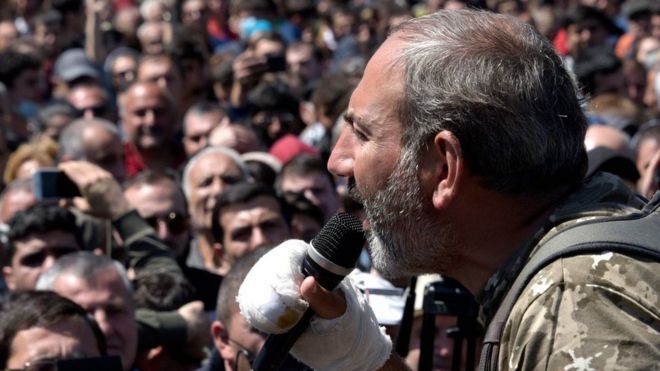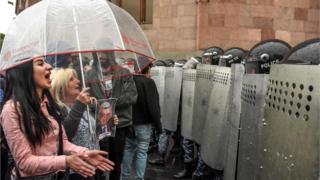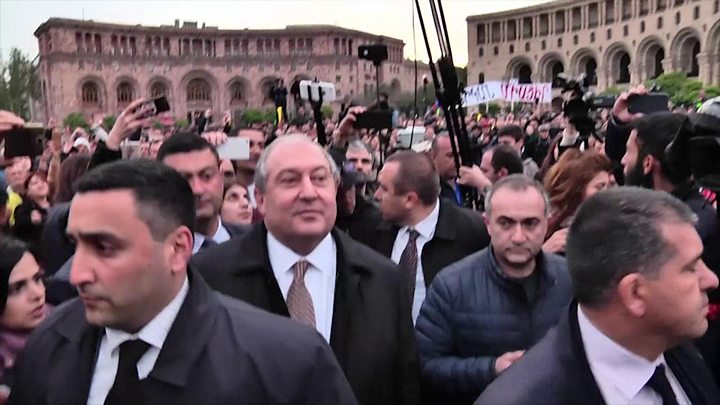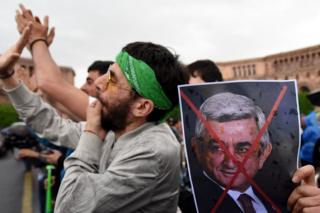Talks between Armenian leaders break down amid protests
 Image copyrightAFP Image captionOpposition leader Nikol Pashinyan has called for a "velvet revolution"
Image copyrightAFP Image captionOpposition leader Nikol Pashinyan has called for a "velvet revolution"
Talks between Armenia's PM and an opposition leader aimed at ending anti-government protests have broken down.
Prime Minister Serzh Sargsyan walked out of a televised meeting with Nikol Pashinyan in the capital, denouncing the opposition's "blackmail".
Mr Pashinyan wants Mr Sargsyan to resign over a constitutional change he says is an effort to retain power.
The change transferred significant power to the prime minister, a role Mr Sargsyan only took on last week.
He stepped down as president after reaching his two-term limit.
Armenia country profile
On Saturday, after days of protests, Mr Pashinyan told thousands of opposition supporters in the capital Yerevan that Mr Sargsyan did not understand the "new reality" in Armenia.
He said he was prepared to discuss only the details of a transfer of power. The country's new president then suggested that the two men should hold talks.
But the televised meeting at a hotel in Yerevan on Sunday was brief. Mr Pashinyan told the prime minister: "I came here to discuss your resignation."
In response, Mr Sargsyan said that "this is not a dialogue, this is blackmail", and walked out. Image copyrightAFP Image captionRiot police have been holding back the protesters
Image copyrightAFP Image captionRiot police have been holding back the protesters
Many Armenians want to see genuine change in their country but they feel that they are being deprived of that opportunity because the leadership remains the same, the BBC's Rayhan Demytrie reports. Media captionNew President Armen Sargsyan tries to defuse protestsWhy is there such anger at Serzh Sargsyan?
Media captionNew President Armen Sargsyan tries to defuse protestsWhy is there such anger at Serzh Sargsyan?
Mr Pashinyan recently described the action he leads as a "velvet revolution", referring to the peaceful protests in 1989 that ended communist rule in Czechoslovakia (which later split into two states, the Czech Republic and Slovakia).
The veteran opposition activist, who was jailed over his part in violent protests against Mr Sargsyan in 2008, called on supporters to "paralyse the entire state system" because "power should pass to the people". Image copyrightAFP Image captionHere Serzh Sargsyan's face is scored out on a poster
Image copyrightAFP Image captionHere Serzh Sargsyan's face is scored out on a poster
While president, Serzh Sargsyan said he had no intention of becoming prime minister at the end of his second five-year term.
However, on Tuesday he was chosen by parliament to serve as prime minister.
In 2008, when Mr Sargsyan was first elected president, demonstrations erupted, with protesters alleging vote-rigging. At least eight people died in clashes with the authorities.
His supporters argue that the tough veteran of the Nagorno-Karabakh war with Azerbaijan in the late 1980s has provided the national security Armenia needs but he has been accused of failing to address continuing tensions with Azerbaijan and Turkey.
Closer to home, critics have identified his rule with widespread poverty and over-dependence on Russia.
- BBC
 Image copyrightAFP Image captionOpposition leader Nikol Pashinyan has called for a "velvet revolution"
Image copyrightAFP Image captionOpposition leader Nikol Pashinyan has called for a "velvet revolution"Talks between Armenia's PM and an opposition leader aimed at ending anti-government protests have broken down.
Prime Minister Serzh Sargsyan walked out of a televised meeting with Nikol Pashinyan in the capital, denouncing the opposition's "blackmail".
Mr Pashinyan wants Mr Sargsyan to resign over a constitutional change he says is an effort to retain power.
The change transferred significant power to the prime minister, a role Mr Sargsyan only took on last week.
He stepped down as president after reaching his two-term limit.
Armenia country profile
On Saturday, after days of protests, Mr Pashinyan told thousands of opposition supporters in the capital Yerevan that Mr Sargsyan did not understand the "new reality" in Armenia.
He said he was prepared to discuss only the details of a transfer of power. The country's new president then suggested that the two men should hold talks.
But the televised meeting at a hotel in Yerevan on Sunday was brief. Mr Pashinyan told the prime minister: "I came here to discuss your resignation."
In response, Mr Sargsyan said that "this is not a dialogue, this is blackmail", and walked out.
 Image copyrightAFP Image captionRiot police have been holding back the protesters
Image copyrightAFP Image captionRiot police have been holding back the protestersMany Armenians want to see genuine change in their country but they feel that they are being deprived of that opportunity because the leadership remains the same, the BBC's Rayhan Demytrie reports.
 Media captionNew President Armen Sargsyan tries to defuse protestsWhy is there such anger at Serzh Sargsyan?
Media captionNew President Armen Sargsyan tries to defuse protestsWhy is there such anger at Serzh Sargsyan?Mr Pashinyan recently described the action he leads as a "velvet revolution", referring to the peaceful protests in 1989 that ended communist rule in Czechoslovakia (which later split into two states, the Czech Republic and Slovakia).
The veteran opposition activist, who was jailed over his part in violent protests against Mr Sargsyan in 2008, called on supporters to "paralyse the entire state system" because "power should pass to the people".
 Image copyrightAFP Image captionHere Serzh Sargsyan's face is scored out on a poster
Image copyrightAFP Image captionHere Serzh Sargsyan's face is scored out on a posterWhile president, Serzh Sargsyan said he had no intention of becoming prime minister at the end of his second five-year term.
However, on Tuesday he was chosen by parliament to serve as prime minister.
In 2008, when Mr Sargsyan was first elected president, demonstrations erupted, with protesters alleging vote-rigging. At least eight people died in clashes with the authorities.
His supporters argue that the tough veteran of the Nagorno-Karabakh war with Azerbaijan in the late 1980s has provided the national security Armenia needs but he has been accused of failing to address continuing tensions with Azerbaijan and Turkey.
Closer to home, critics have identified his rule with widespread poverty and over-dependence on Russia.











Comment